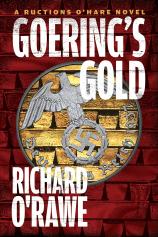Interview: June 2, 2022
Richard O’Rawe follows up his debut novel, NORTHERN HEIST, with the newly released GOERING’S GOLD. Based on one of history's greatest unsolved heists, this thrilling sequel pits ex-IRA soldier Ructions O'Hare against the IRA, Interpol and neo-Nazis. In this interview conducted by Michael Barson, Senior Publicity Executive at Melville House, O’Rawe talks about his decision to make Nazi Reichsmarschall Hermann Goering the subject of his second book, why it’s so important to have patience during the writing process, and who he would like to see play Ructions in a potential film or television adaptation of GOERING’S GOLD.
Question: After you completed your first novel, NORTHERN HEIST, did you immediately begin laying the plans for the follow-up novel that became GOERING’S GOLD? Or did you first wait to see what the reaction to it was?
Richard O’Rawe: Shortly after I had written NORTHERN HEIST, I was watching a biography of Hermann Goering on television and the thought struck me (as I looked at his big smiling face), “There's a novel in you, boyo.” Here was a good-time Charlie, a playboy who wanted nothing more than to enjoy the good life rather than go to war. I told myself that Hermann was known to be a lover of stolen art, gold, diamonds, Cuban cigars and garish uniforms, that he was a hedonist, an anti-Semite and a thoroughly despicable scoundrel. Perhaps the perfect villain in a novel? What if Goering saw that the war was going to be lost in 1944 and hid tons of gold for a rainy day? Therein lay the foundation stone upon which I built GOERING’S GOLD.
Then, on the way down to an Ireland versus New Zealand rugby match in 2017, I ran the theme past my biggest critic: my daughter, Berni. Suffice to say that we had an argument over whether or not the book should be a follow-up to NORTHERN HEIST, with Berni arguing that Ructions O'Hare and Co. should be central to the story. I couldn't see it. She could. She won. Logic was always her strong point. I must say that it was brilliant to revisit Ructions, Tiny, Serge and Eleanor once more. And to add neo-Nazis to the mix? That was a bonus!
Q: Was there really a legend that Hermann Goering planned to ship his gold bullion off to Ireland so it wouldn’t be seized by the Allies when they threatened to occupy Berlin in the late days of WWII?
ROR: It was I who invented the concept that Goering shipped his gold to Ireland in 1944. Why Ireland? The more I looked at it, the more sense it made. Ireland was a neutral country during WWII and was inherently anti-British. It was also a sleepy village, with little or no crime and very few police officers. Moreover, after the ending of the war, retrieving the loot from a secret location in Ireland would be far easier than anywhere else in Europe. Once the crossover to accepting Ireland as the Treasure Island was made, things began to fall into place.
Q: What exactly was the relationship between the IRA and the Nazi regime during WWII? Was it simply a matter of “The enemy of my enemy is my friend,” that being the British?
ROR: It was indeed a simple matter of “The enemy of my enemy is my friend.” The IRA had as much time for Nazis as they had for the British, but they recognized they could obtain guns, etc. from them. The partnership broke up when the Nazis came to the realization that the IRA were inept amateurs.
Q: In the course of writing NORTHERN HEIST, what did you learn that made the writing of GOERING’S GOLD an easier process?
ROR: In the course of writing NORTHERN HEIST, I learned to have patience, to allow the flow of the book and the storyline to mature, like a fine Irish whiskey. In both books, I didn't have the whole story before I started the writing process. I might have had a few perimeters, a few idiosyncrasies here and there, some ingots that added to the complexity of the plotline, but I didn't have the whole book. That came over time. Having patience stood me in good stead with GOERING’S GOLD. The joy in writing a novel, in my opinion, is being open to all plotlines, to not having a fixed concept of where it's all going because, you never know: you may find a better ending as you approach the end!
Q: Ructions O’Hare is a hugely charismatic character. Did you base him in part on anyone you’ve ever known earlier in your life? (And don’t say Errol Flynn.)
ROR: Ructions O'Hare is an amalgam of several people I met while in the IRA.
Q: Do you see your path going forward as continuing to alternate between writing fiction and nonfiction books?
ROR: I am presently finishing off a commission, a biography. When that is finished, I do not think I'll write another nonfiction book. I prefer fiction. I have about three good ideas for novels in my head, so I need to finish up this bio and get to them!
Q: Is there any chance we will someday see Ructions appearing either in a television series or on the big screen? If so, who would be your choice to portray this irresistible rogue?
ROR: There's every chance we'll see Ructions appearing on the big screen. I think this GOERING’S GOLD book is very filmable. Who might play him? Well, there's an actor over in Ireland called Shaun Blaney who is playing the role of Gerry Conlon in a play I co-wrote called “In the Name of the Son” (after my biography of Gerry Conlon of the Guildford Four, [fabulous read, dear reader!]) Shaun would be a brilliant Ructions. But who knows? Casting isn't my forte.




